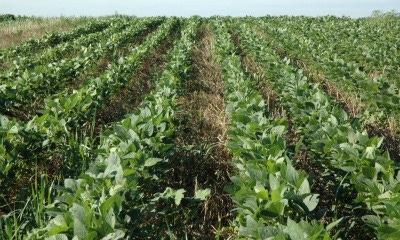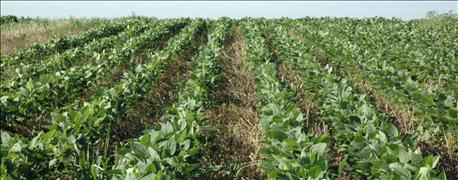
Farmers can sign up now for replicated strip trials on their farm for 2016 through the new Missouri Strip Trial Program.
The University of Missouri Extension, the Missouri Corn Growers Association and the Missouri Soybean Association are working together to form the state's first network of farmers to conduct strip trials. According to Darrick Steen, environmental director for Missouri Soybean and Missouri Corn, the program is about applied research on growers' fields in real life settings that yields practical use information. "We want to provide and deliver results quickly so that it can have an immediate impact in an operation for the next growing season," he notes.

TIME FOR TRIALS: Missouri farmers can sign up for a new strip trial program this year. A collaborated effort between MU Extension and commodity organizations, trials will look at profitability of cover crops, nitrogen and phosphorus.
Modeled somewhat after Iowa Soybean Association's On-Farm Network, the Missouri Strip Trial Program will use a variety of precision ag tools including remote sensing, GPS, and yield monitors to collect data in real world conditions. Growers, along with their agronomist and representatives of the program will follow protocols to ensure the accuracy and reliability of the data.
According to Greg Luce, MU Extension state grain crops specialist, organizers want the process to remain simple. He says it boils down to planting strips in a field, using just two to three treatments, and then replicating the treatments. "One requirement is to work with growers that can capture data from across the field using a calibrated yield monitor," he notes.
The new program differs from small plot comparisons sometimes used in agronomic experiments. Typically, those types of trials look for a uniform piece of ground. They ideally look for one soil type and topography. Luce says landscape diversity drives the Missouri Strip Trial Program. "No field is the same from border to border," he notes. "We will test under variable terrain and soil types. We are looking at how the treatment works on a working farm using commercial scale equipment."
Making trials relevant
State nutrient management specialist John Lory says a seven-member farmer panel prioritized 2016 trials will focus on three areas: cover crops, phosphorus and nitrogen.
Cover crop trials. In the area of cover crops, we are looking at trials that assess the effect of cover crop kill dates on corn and soybean planting and yield.
Phosphorus trials. Farmers want to optimize phosphorus as they look to cut costs and improve the bottom line. Trials will look at where applying phosphorus produces a profitable yield response. Lory notes that a multi-year trial could look at how long a field can go without adding phosphorus before it impacts profitability, an indicator of resilience in your soil phosphorous supply.
Nitrogen trials. These trials will look at timing of nitrogen applications. They will be designed to see if in season or split nitrogen application does in fact offer a yield advantage.
The goal, Lory says, is to have 50 projects in farmers' fields in 2016. "We would like to have over 100 trials per year by 2018."
Protecting privacy
Researchers will collect the results of the on farm strip trials and place them in a database. However, they will remain anonymous. "The results will be associated with a county," Lory explains. He says Missouri will look to Iowa's model and work to incorporate an anonymous, searchable database on the trials by county.
For most trials, farmers are required to sign up for just one year. However, Lory says some cover crop and phosphorus trials may require multiple years.
Building the bottom line
Steen says commodity organizations are focusing on providing farmers with agronomic and environmental practices that will improve their bottom line. There are benefits to data from individual fields, he notes, but being able to test regionally or statewide and provide that collective data offers information that empowers growers.
He says that commodity groups support agronomic improvement that is profitable and sustainable, but they do not want to push practices that lead farmers down the path in either direction without data proving worth.
"Ultimately," Steen says, "we want to improve the quality of our agriculture and the quality of our environment at the same time."
For more information visit Missouri Strip Trial Program.
About the Author(s)
You May Also Like






